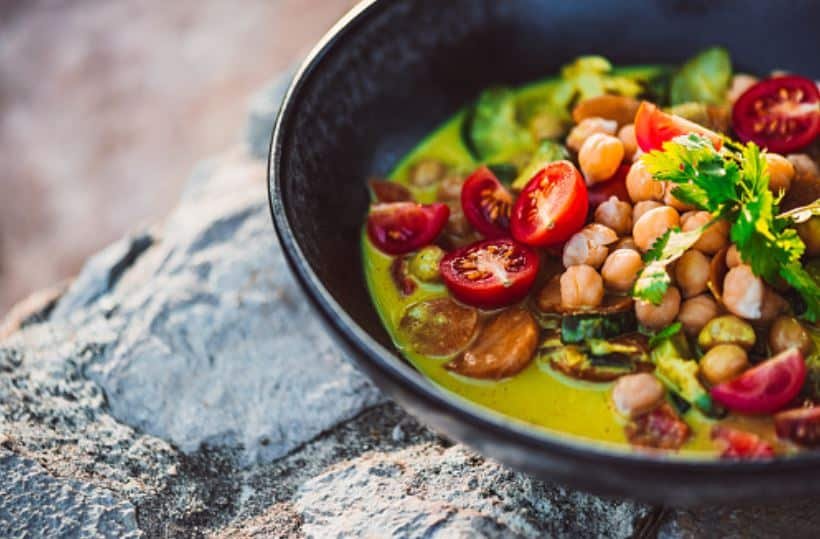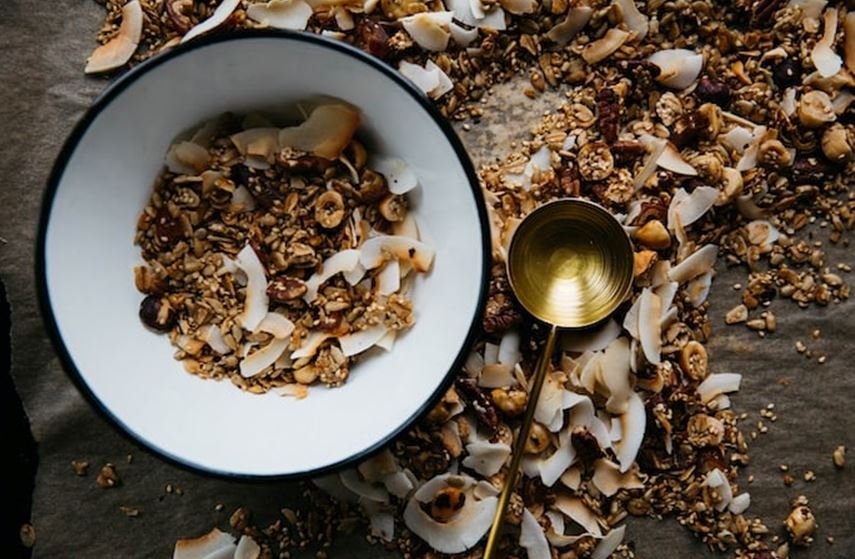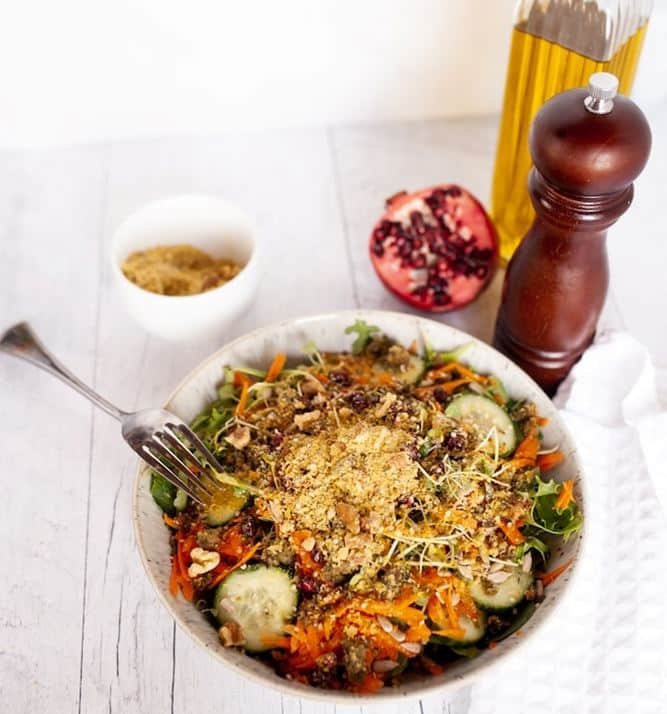Food
Top 5 Food to Add to The Vegetarians Diet

Vegetarians avoid eating meat for various reasons, including health, environmental, ethical, religious, and economic considerations. Instead, they enjoy a variety of grains, beans, nuts, seeds, fruits, and veggies, and some even eat eggs and cheese.
A vegetarian diet has many benefits, such as a lesser risk of diabetes, heart disease, and obesity. Additionally, vegetarians eat more fruits and vegetables than the average person and consume significantly less saturated fat.
But are you getting enough vitamins and other nutrients needed by your body? According to the NHS, you could miss out on essential nutrients if you don’t plan your vegan nutrient properly. Though a vegetarian diet can meet nutritional needs and is a healthy option, some nutrients, such as protein, iron, zinc, calcium, vitamin B12, and vitamin D, may be more challenging to obtain from some vegetarian diets.
Experts recommend healthy plant-based foods, such as whole fruits and vegetables, legumes, nuts, and whole grains, while limiting less healthy options, such as sugar-sweetened beverages, fruit juices, and refined grains.
Find below some foods to add to a vegetarian diet:
[lwptoc numeration=”none”]
1. High Protein

Eggs and dairy products like yogurt and cottage cheese are good examples of vegetarian protein sources. Protein-rich foods suitable for vegans include legumes (beans, lentils, peas), seeds, and nuts.
For instance, whole soy foods like edamame, tofu, tempeh, soy milk, and soy nuts are rich in lean protein. In addition, soy is a complete protein, which means it has all the essential amino acids your body needs to work at its best. As such, global soy use in food production continues to rise and has doubled over the last two decades.
However, stick with whole soy if you want the most nutrients and health benefits.
Besides soy, here are some meatless protein options for vegetarians:
- Eggs
- Tree nuts, including walnuts, almonds, and pecans, contain many protein, fiber, and heart-healthy fats.
- Legumes like beans, peas, and lentils
- Greek Yogurt
2. Vitamin B12 Fortified Foods

The vegan diet boasts a variety of nutrients. But there’s a key vitamin you might be missing– B12, an essential vitamin for cell metabolism and the production of blood cells. Studies reveal that up to 92% of vegans are vitamin B12 deficient.
Animal products, such as eggs and dairy, are the only sources of B12. As such, Vitamin B12 deficiency is a common concern among vegetarians and vegans. Vegans and vegetarians should eat plenty of fortified foods and discuss taking a vitamin B12 supplement with their healthcare provider.
Examples of Vitamin B12 fortified foods are:
- Cheese, milk, non-dairy milk, and other dairies
- Nutritional yeast
- Meat substitutes and cereals.
- Eggs
- Nutritional yeast or another form of yeast species known as brewer’s yeast.
3. Calcium Rich Foods

Your calcium needs vary based on age, gender, and risk factors for osteoporosis in your family history. For vegetarians, calcium is abundant in dairy products. Vegans can get the calcium they need from cooked leafy greens like kale and collards. Calcium plus vitamin D, which aids in calcium absorption, is another option.
Other options include:
- Broccoli
- Fat-free or low-fat milk, yogurt, and cheese
- Calcium-fortified plant-based milk such as soy or almond
- Almonds and almond butter
- Green leafy vegetables such as kale, turnip greens, and collard greens
- Calcium-fortified breakfast cereals
- Fortified juice
- Beans, including chickpeas, soybeans, and black beans
- Calcium-set tofu
4. Vitamin D-fortified foods
According to one study, 41.6 percent of Americans may be vitamin D deficient. Vegans are more at risk of deficiency as many of the foods highest in vitamin D, such as egg yolks, salmon, and shellfish, aren’t vegan-friendly.
In addition to getting small amounts of safe sun exposure, which helps your body make vitamin D, vegans can choose vitamin D-fortified foods like orange juice, cereal, or plant-based milk.
Options include:
- Fortified soy milk
- Mushrooms
- Fortified cereals and juice
- Fortified rice milk
- Fortified almond milk
- Vegan-friendly vitamin D supplements
5. High-Quality Carbs

Moderate intake of carbs is crucial as they are your body’s primary energy source. High-quality carbohydrates contain various essential nutrients, such as vitamins, minerals, fiber, and antioxidants, which are critical in developing a high-quality vegan or vegetarian diet.
Combine them with some healthy essential fats in nuts, particularly walnuts, seeds like pumpkin, and protein from tofu, eggs, or dairy for a balanced diet.
However, avoid processed carbs such as white rice, white bread, pastries, pasta, and sodas.
Healthy and nutritionally dense carbs you can combine in your vegan meals include:
- Unprocessed foods, including whole grains, starchy vegetables, and legumes as fiber-rich carbohydrate foods.
- Legumes, including peas, chickpeas, beans, lentils, and edamame
- Whole sources of fruits such as oranges, berries, pineapple, bananas, melons, apples, kiwi, melons, pears
- Whole grains, such as barley, oats, buckwheat, brown rice, millet, and quinoa, are complex carbohydrates that contain fiber and protein.
- Non-starch veggies, including amaranth or Chinese spinach, artichoke, baby corn, asparagus, bamboo shoots, bean sprouts, and beans
- Unprocessed, starchy vegetables contain fiber and protein, such as potatoes, winter squashes, sweet potatoes, corn, and peas.
In Conclusion
Make a nutrition plan with a doctor or registered dietitian if you’re considering a vegan or vegetarian diet. This is crucial if you already have diabetes, heart disease, obesity, or a digestive disorder. The expert will also be able to recommend the best nutritional supplements. Get in touch with a nutritionist for personalized advice, as dietary needs change with age, gender, and other health factors.
-

 Celebrity4 weeks ago
Celebrity4 weeks agoIs YNW Melly Out Of Jail? What Is The YNW Melly Release Date, Career, Early Life, And More
-

 Sports4 weeks ago
Sports4 weeks agoMore Than Just a Game: How College Sports Can Shape Your Future
-

 Tech3 weeks ago
Tech3 weeks agoAI Software: Transforming the Future of Technology
-

 Tech3 weeks ago
Tech3 weeks agoAll About Com. Dti. Folder Launcher: Features, Benefits, Tips, And More













